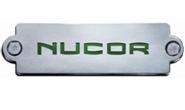Market Segment

December 27, 2013
Nucor DRI Start-up Successful
Written by Sandy Williams
A Christmas Eve start-up of the Nucor direct reduced iron (DRI) facility in St. Louis Parish, Louisiana, came off without a hitch. Within 24 hours the output quality matched best-in-class levels of Nucor’s Trinidad plant, said the company.
![]() “We are very pleased to announce this important step in executing our raw materials strategy,” said John Ferriola, Nucor’s President and CEO. “I want to personally thank our team in St. James Parish for their commitment and perseverance working right through the holiday season in achieving this important success.”
“We are very pleased to announce this important step in executing our raw materials strategy,” said John Ferriola, Nucor’s President and CEO. “I want to personally thank our team in St. James Parish for their commitment and perseverance working right through the holiday season in achieving this important success.”
Nucor broke ground for the $750 million facility in March of 2011. Originally scheduled for start-up in the October 2013, ramp-up was delayed by the collapse of a storage dome on Sept. 25. The new facility is expected to produce 2.5 million tons of DRI per year and, in combination with the 2 million ton annual capacity of the Trinidad facility, will move Nucor closer to its goal of producing 6-7 million tons of high quality scrap substitute annually.
A second DRI facility is planned for the site and is expected to take less time to construct and cost slightly less–around $550 million to $600 million. No date has been given by Nucor for groundbreaking.
“We want to get the first one up and running and then we will take a look at what we want to do with the second facility,” said CEO John Ferriola, in the company’s third quarter conference call. “I can tell you there’s been an awful lot of interest in the marketplace on purchasing DRI from us and having a facility that would run on a merchant basis.”
Commenting on how the new facility will affect Nucor’s raw material needs for its steel making operations, Ferriola said:
“Well, it certainly will include more DRI… What it really does is give us a tremendous amount of flexibility. So every month, we’ll go out and we’ll take a look at the various commodities. We’ll look at where we are with DRI. We’ll look at the HBI pricing. We’ll look at pig iron pricing. We’ll look at prime scrap, obsolete scrap. And based upon that, we will adjust the basket, as you call it, the basket or the recipe, we would refer to it as, on almost a monthly basis and do what gives us the best cost advantage each month.”
The introduction of domestic DRI production and the escalation of electric arc furnaces that can substitute DRI for high quality scrap has created some concerns about the impact of DRI on the scrap industry. The low price of natural gas and the production advantages afforded by EAF production versus blast furnace production has analysts predicting EAFs will produce 70 percent of domestic steel in the next 5 to 10 years.
Currently, US steelmakers use over 60 million tons of scrap annually. Although scrap is used in EAFs, DRI, with its high iron content and lower impurities, allows EAFs to produce higher value products. Increased demand for DRI is likely to push scrap prices downward—a negative for the scrap industry but a possible boon for other steel makers.
Commenting on the Nucor facility earlier this year, Saikat Dey, chief of procurement and strategy at Severstal NA, said, “Suddenly you have two and half million tonnes of net mass balance of product available. Other people are also building DR plants, which is great as this will impact the demand and the supply for scrap. Prices of bushes and bundles could fall as a consequence. And if that is the case we could stand to benefit, not having put significant capital investment in DR.”
Nucor also hedged its bets by investing in natural gas production through its partnership with Encana Oil and Gas in 2010 and extending that agreement in 2013. The partnership ensures Nucor a source of low cost natural gas for its Louisiana DRI facility, the anticipated second facility, and all of its US steel plants for the next 20 years. The original agreement exceeded expectations by 60 percent and approximately 250 wells have been drilled to date. Recently, Nucor and Encana agreed to suspend further drilling temporarily due to weakness in natural gas prices.







